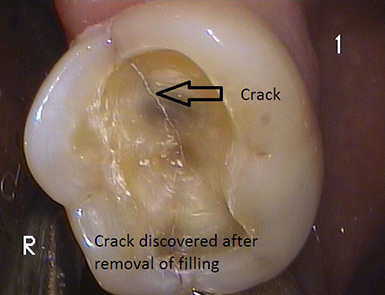how to fix a cracked tooth
By: Jason Brewer, Mentor Dentist at Dental Associates Wauwatosa
If you're like many of my patients, you've probably experienced a cracked tooth at some point—or at least thought you did. So what treatment is available to fix a cracked tooth? Read on to find out!
How do I Know if I Have a Cracked Tooth?
 As we age, our teeth can begin to have little lines or cracks on the surface. Although these may seem concerning, often times they are simply what we call "craze lines." These craze lines are in fact cracks in the tooth enamel, generally limited to the superficial outer layer of the tooth, that develop over time with normal wear and tear. Craze lines are not serious as long as they do not penetrate to the inner surface of the tooth called dentin.
As we age, our teeth can begin to have little lines or cracks on the surface. Although these may seem concerning, often times they are simply what we call "craze lines." These craze lines are in fact cracks in the tooth enamel, generally limited to the superficial outer layer of the tooth, that develop over time with normal wear and tear. Craze lines are not serious as long as they do not penetrate to the inner surface of the tooth called dentin.
I do get patients, however, who come in and are concerned that they have a cracked tooth that may require treatment. So if you look closely at your teeth in a mirror and notice tiny, vertical lines...don't fret! A good rule of thumb is that if you don't feel pain or have any symptoms, your tooth probably does not need treatment.
If you have a cracked tooth, you may notice sensitivity or pain when biting and chewing food. In more severe cases, it will hurt consistently, especially around the gums if the tooth segment is loose. There are various types of cracked teeth, and depending on how deep the damage goes, we will suggest certain treatment options based on your situation. Treatment can be as simple as a crown, but in more extreme cases removing the tooth completely.
It is also important to note that a cracked tooth is different than a chipped tooth. Dentists and hygienists can detect a chip in a tooth by using a dental tool called an "explorer" when examining the teeth. You may also detect a chip by feeling a rough surface on the tooth with their tongue. If the explorer can't find a chip, then the damage is superficial and it won't need treatment.
The Difference Between a Cracked Tooth and Chipped Tooth
Cracked tooth
A cracked tooth is most common on teeth in the back of your mouth where the majority of chewing happens. All degrees of a crack can be classified under the diagnosis of "Cracked Tooth Syndrome." Typically a cracked tooth will require more invasive treatment than a chipped tooth. If the crack extends beyond the surface of the tooth, we may suggest a root canal and then place a crown to cover the entire tooth. We will then monitor the restoration to see how the tooth responds to ensure the patient remains comfortable with the treatment.
Here is the most common treatment for a cracked tooth:
- Least severe: the tooth will require a dental crown to cover and restore the damage.
- Medium severity: if the crack has extended a little deeper into the tooth, we will often treat it by performing a root canal procedure, then placing a crown on the tooth to restore aesthetics and functionality.
- Most severe: If the crack has extended deep into the tooth, we will likely have to perform a tooth extraction. This is the most extreme situation and we will always try our best to keep your natural teeth and repair the damage if possible. If an extraction is the best treatment plan, a dental implant can be used to replace your original tooth.
Chipped tooth
A chipped tooth occurs more frequently in the front teeth. Most of my patients who experience a chipped tooth are mainly concerned about aesthetics and functionality. Treatment for a chipped tooth is something that we can typically fix within one day. We will clean the site, then bond a tooth-colored filling to the area to restore the tooth aesthetically and functionally.
The tooth-colored filling material makes the restoration appear seamless! We can match the material to your teeth nearly perfectly so that when you smile, no one can even tell you had work done. As far as eating and strength of the restoration, it all depends on the extent of the damage and the position of the chip. After your restoration, it's important to be more cautious about biting down on harder foods; while the restoration will be strong and functional, manmade materials are never as strong as natural teeth.
All in all, if you think you have a cracked or chipped tooth, we will work with you to find the best treatment plan to help relieve pain and restore your teeth both functionally and aesthetically!
how to fix a cracked tooth
Source: https://www.dentalassociates.com/blog/how-fix-cracked-tooth
Posted by: williamsbriver.blogspot.com

0 Response to "how to fix a cracked tooth"
Post a Comment